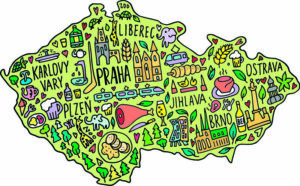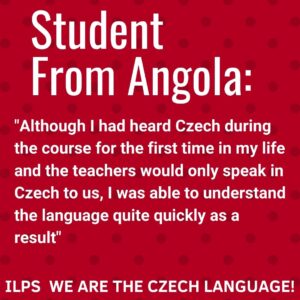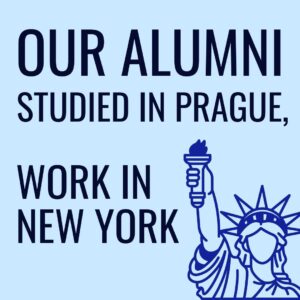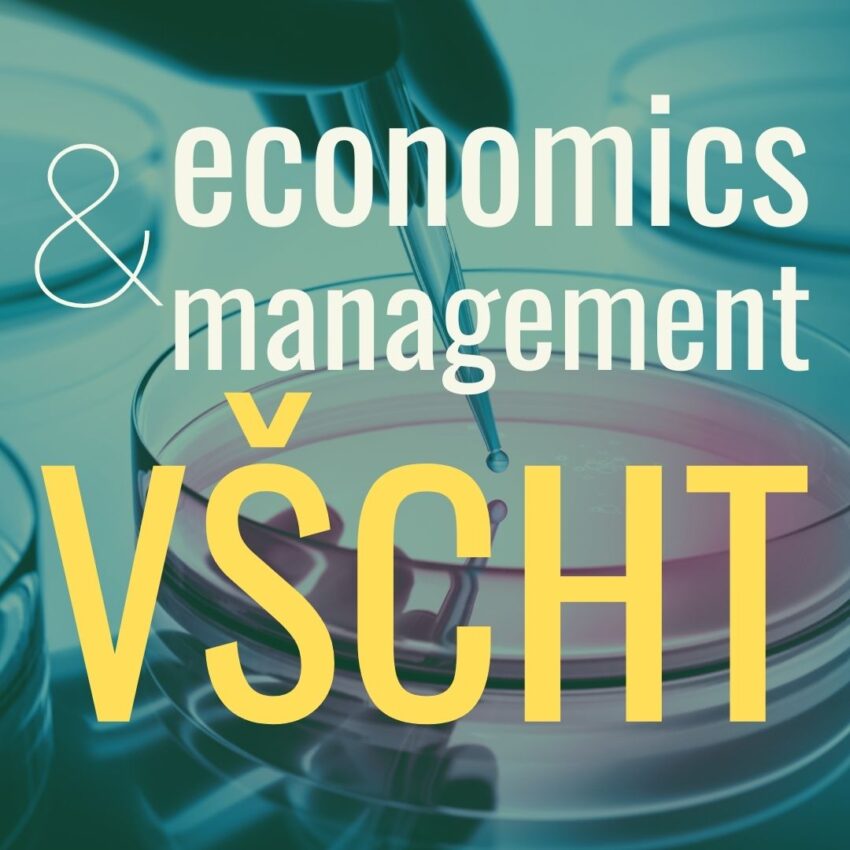A ÚJOP UK graduate talks about his experience of entering and studying economics at the Czech University of Chemistry and Technology (VŠCHT). You may ask Artem about his experience via his Instagram-account
Study at ÚJOP UK
ÚJOP Infopoint: Hello! The Institute for Language and Preparatory Studies of Charles University is on air. My name is Anek, and my guest today is Artyom, our graduate. Hello, Artyom!
Artem: Hello!
ÚJOP Infopoint: Let’s tell right away where you were studying and when you graduated.
Artem: I was studying a year ago, but the time has passed very quickly. I was studying at the Hostivař study center, the field of economics.
ÚJOP Infopoint: Great! So, a preparatory course for admission to economics-related, financial and other programs of this kind, for people who are going to work with money. Please tell us what you studied there, well, besides Czech.
Artem: Yes, in addition to Czech, there was also mathematics and English. But we also had lectures on economics, and also a special subject called Čeština pro ekonomy, where we primarily studied even more vocabulary and some other topics, like detailed grammar.
ÚJOP Infopoint: Was it difficult to study?
Artem: At that time it seemed to me that perhaps it was not so simple, but studying at a university, I now understand that it was a pretty easy time then, without any intense stress. And there just wasn’t that much homework.
Course as a preparation for studying
ÚJOP Infopoint: Yeah. Well, if you were to assess now, having competed the course and completing the first year in university, do you think this course was useful, our preparatory course?
Artem: Undoubtedly. Here I would point out, of course, in addition to the work of teachers, the subjects themselves, because they are all very important. And I would not say that one could just not attend any of the subjects sometimes or that sort of things. Because mathematics is very important due to the various structures that we use in Russian in a slightly different way. And because of this, you can then misunderstand your teacher or speak incorrectly yourself. And English definitely needs to be maintained, because with intensive study of the Czech language, the level of English is decreasing right before your eyes. And, of course, economic subjects are also very important in order to understand some core things in Czech, because most of the students come with some knowledge, but it needs to be slightly transformed into Czech.
ÚJOP Infopoint: Yes. Now tell me then, please, which university did you enter?
Artem: I entered VŠCHT, the specialty is Economics and Management. I have been studying for a year now and I hope I will continue.
ÚJOP Infopoint: And what exams did you take to enter? How did the entrance exams look like?
Artem: I was lucky and I passed thanks to the average score of my school certificate. If you transform it into the Czech grading system, I have a certificate with the average score less than one and a half, respectively, it’s somewhere around four and a half or more. I only took a Czech language test, and since I had a certificate from the language course of Charles University, the conversation itself – the interview – lasted literally 5-10 minutes, and after that I got accepted immediately.
ÚJOP Infopoint: Well, here’s another reason to study at ÚJOP. Study with us, and the results of your exams are taken unquestioningly and you get accepted immediately. See how good! Excellent! Now tell me, how was the start of you studying? Was it difficult to start talking to your teachers, classmates, how was it in general?
Economics and Management studies at VŠCHT
Artem: I wouldn’t say that it was difficult. Well, the only effort that needs to be made is to overcome some kind of fear, some kind of internal language barrier and not be afraid of making mistakes. Mistakes are not bad. You learn through them. And Czech people are very understanding. I would say that on the contrary, they are all a bit shocked: how can it be, one year at a language course and then you immediately study at a university? For them, this is quite a surprise. So they are trying to help you. For example, my classmates – I intentionally asked them to just correct my grammatical errors somewhere, to help me with my pronunciation sometimes, and well, this helps a lot. As for the teachers, it depends a lot on the size of the university, because Economics and Management at VŠCHT is a very small department and the teaching staff is less than 30 people. And there are only seventy first-year students, which means that everyone knows each other, everyone remembers each other’s names. And this certainly involves some kind of relationship, a closer and a more homely one, and it is very nice. And it is very helpful for your studies.
ÚJOP Infopoint: Yeah, by the way, we always advise our students, when they choose which university to go to study after our courses, we always advise them to pay attention to some small universities or small departments, too. Because there will definitely be some kind of homely atmosphere there, and the teachers themselves will know you in person, know your name, and it may even be easier to study in that way, precisely from a purely psychological point of view. You’ve said that you are studying at a small department of VŠCHT.
Artem: Yes.
ÚJOP Infopoint: What does a small department mean? What does it mean, is it a small faculty?
Artem: Unfortunately, we don’t even have a faculty yet, but I think with such a rapid development, as the number of přihlášky (applications) has doubled, or even tripled. I think in a short time, sooner or later, we will definitely get the status of a faculty.
ÚJOP Infopoint: So, is this an institute for now?
Artem: So far, only an institute, yes. But I think that in a year or two it will already be a full-fledged faculty.
ÚJOP Infopoint: How is the studying organized at your institute?
Artem: In a pretty easy way, actually. There are compulsory subjects, unlike, for example, at VŠE, where students are free to choose their own subjects. We have some kind of base, a program that we have to cover and to which some elective subjects can be added, such as, for example, chemistry related to economics; or, if someone is interested in marketing, a lot of subjects about marketing; if someone is interested in finance or, for example, HR, all of this is there. All this, including good teaching, so it’s all organized in a pretty cool way.
ÚJOP Infopoint: That means, despite the fact that you study at a university of chemistry and technology, you do not have compulsory subjects in chemistry and it is just an elective subject?
Artem: Yes, this is only an elective subject and this is a huge advantage of VŠCHT, in contrast to, for example, ČZU (University of Life Sciences Prague), where there are compulsory agricultural subjects that the majority, or rather, not quite everyone likes. This is a pretty significant plus of VŠCHT.
ÚJOP Infopoint: Well, in that case, what are you studying here, at Economics and Management at a university of chemistry and technology?
Artem: The first year was mainly focused on enterprise management and economy itself – a very useful subject that allows students to understand the processes that occur in an enterprise. But there was also management, there was management psychology, which is also a very interesting subject, because in the future some people will have to hire somebody or work with a team. Very useful. And also, of course, there was mathematics, English. Later, English will remain, but we will be able to choose to divide this subject into two parts and choose another language as the second part: Spanish, French, German, or you can leave English, there is even Russian – and continue learning some other language as well.
Student life
ÚJOP Infopoint: Well, obviously student life is not limited to studies. For some students, studying is probably a smaller part of the entire student life. How does that work for you there?
Artem: It is difficult to notice this student life besides studying subjects at first, but on Facebook and on some other platforms, websites, the information about some events that take place there is published regularly. I myself actively participate, both as a volunteer and also as a VŠCHT employee, I take pictures, I am constantly invited to some events. I even get paid a scholarship for my help at some of them, which is insanely cool. You can, even though just a little, but work part-time at the university itself.
ÚJOP Infopoint: So, you are now finishing the first year, which means that you have already passed two, or, well, you are at the end of the second examination period now. That is, the first one has already taken place, you have passed the first exams sometime this winter, in January-February, and now you are taking them for the second time. What is it like to take exams at a Czech university?
Artem: It’s not that difficult if you have some kind of a system. Attending your classes systematically and just listening and delving into the lectures, nothing extra, nothing more is required. Some basic knowledge in the subject that is taught to you in a course, and, probably, the biggest problem is still the language barrier. Because people who misunderstood something somewhere and are afraid to ask or don’t know how to do it correctly, they have it all building up like a snowball and, thereby, later it all opens up during an exam. And there is no longer that much time, there are no longer that many opportunities to re-learn the whole course, the whole semester. Therefore, if you approach the study of a subject systematically, as for me, no difficulties should arise.
ÚJOP Infopoint: Basically, like everywhere else, it seems to me that in this regard, Czech universities are no different from any other ones. The only difference between them is that you have to speak Czech. And this is always such a big question. Often parents, when they call or write to us, trying to find out, they say: “Well, how is it actually? Yeah, it is possible to imagine studying at a university there, but to speak Czech all the time… In general, is it actually difficult to master Czech at all and how to do it?”
Tips and Tricks on how to improve your Czech
Artem: It is impossible to master the language, because it is a never-ending process. You can only learn at a certain speed, and this speed, I would say, heavily depends on the language environment. There are many examples of how Russian-speaking people come to a university and simply lock themselves up in some kind of balloons of their own and do not speak Czech. They speak when it’s necessary, absolutely necessary, but it’s like walking into a store, saying “Dobrý den!” and that’s all. Therefore, the language simply stops developing after language courses and sometimes even deteriorates, unfortunately, simply because they do not use it in practice. But if you use it every day, if you communicate, consume some information in Czech, listen to podcasts, watch movies, despite the fact that Czech dubbing does not sound very nice; but there are some Czech films and watching them, I would say, is a must in order to develop not only some kind of spoken language, but also a little bit of standard Czech, will also be useful.
ÚJOP Infopoint: By the way, on our blog you can find several articles that also tell exactly about the ways to learn Czech in addition to the classes that you will have at school. These are podcasts, these are films, these are some, perhaps, books and articles. Make sure to check out our blog, you’ll find it all there. Maybe a couple more life hacks from you? It’s just that I was told that you have a very good pronunciation of the Czech language and even Czechs do not always immediately distinguish you from themselves, let’s put it like this. How can one achieve this?
Working on accent
Artem: There is an accent anyway. I would just say that some people don’t hear it that much. Everyone perceives it differently, but some people say that it is more of a Slovak accent, some say that there is some kind of accent, but it is not really clear which one. For example, my math teacher said that he could not believe that I was a foreigner till the end, despite the fact that my first and last name are not quite Czech. But the most important thing is to listen carefully to what Czech people say and try to repeat.
I tried this technique that I invented myself: choose a character, a person you like, and try to repeat some specific phrases they said as often as possible, sometimes even in your head. It just helps to remember how the muscles work, how the tongue works. And just do it for a long time and gradually you might just adopt some kind of accent from this particular character.
But there is also another life hack, I don’t know why it works, but when Czech people speak, it’s like everything in the neck is very tense. And this is exactly the kind of thing that Czechs often notice, that the Russian language is very soft for them, and when a Russian speaker starts speaking Czech, this softness is transferred, and therefore, it needs to be somehow changed a little into more hardness, into harder consonants. And this just helps to feel some kind of tension in the neck, and because of this your accent also improves greatly.
ÚJOP Infopoint: That’s a very interesting life hack, I never thought about it, that there is such a tension, I’ll have to monitor myself to make sure it’s true. Well, I think that basically we have discussed everything that we wanted. We hereby say goodbye. Thank you very much for coming. Bye everyone, stay tuned for the next videos!
More feedbacks

捷克语和中文有很大不同
我来自中国。捷克语对我来说很难,因为它和中文,英语有很大不同。它们分别属于不同的语系。因此学习捷克语对我来说也是一种挑战。但是学习捷克语同样也很有趣, 当取得进步时,会有巨大的成就感。

我需要申请捷克的大学的研究生,这些课程给予入学考试很大帮助
我叫鸭鸭。我来自中国。今年是我学习捷克语的第五年。之前我在中国的大学学习了四年。作为非斯拉夫人,捷克语对我来说很困难。但功夫不负有心人,坚持听说读写,总能学会。

My First Year at a Czech University – Beginning of Everything
The article source: migrationonline.cz Author: Emiliano da Cunha I came to the Czech Republic because I had always dreamed of studying abroad somewhere where there is a better educational system…

UJOP to the rescue!
Jihad Mahmoud (Syria) „Last year in 2021 I was one of UJOP’s students who did not make it to medical school due to many consequences, such as the pandemic which…

The Brimas: Studied in Prague, Work in New York
Mr. and Mrs. Brima are our alumni, they started their academic career at Charles University. They decided to study medicine in Prague. Now they work at the University of Rochester…

